Leadership and Business Environment Case Study
VerifiedAdded on 2023/06/18
|12
|3981
|448
AI Summary
This case study analyzes the impact of lock-down on the UK's economy, major economic responses of the UK government, Bank of England's implications, and Brexit on the UK's circular flow of income. It also discusses the financial responses of the UK government and their impact on the economy.
Contribute Materials
Your contribution can guide someone’s learning journey. Share your
documents today.
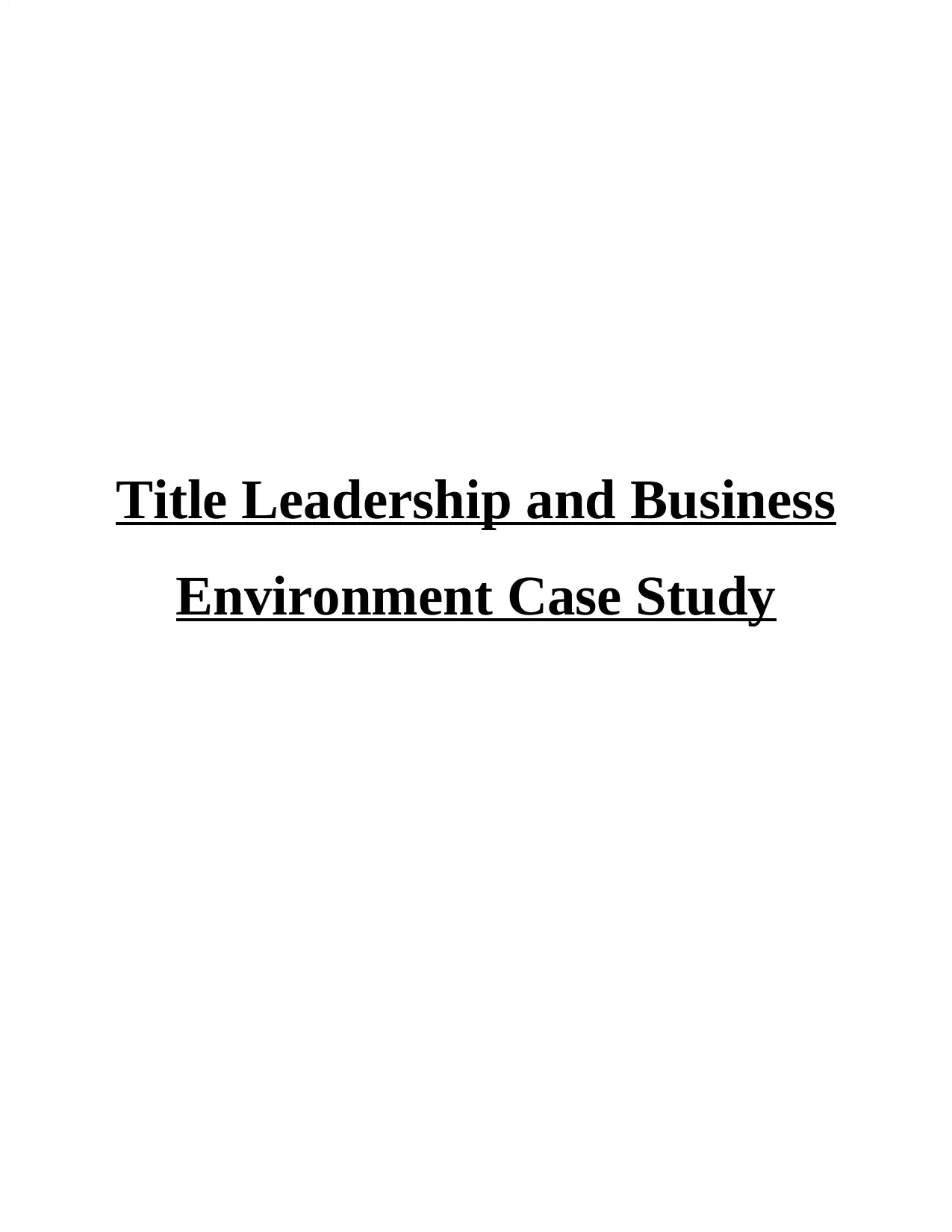
Title Leadership and Business
Environment Case Study
Environment Case Study
Secure Best Marks with AI Grader
Need help grading? Try our AI Grader for instant feedback on your assignments.
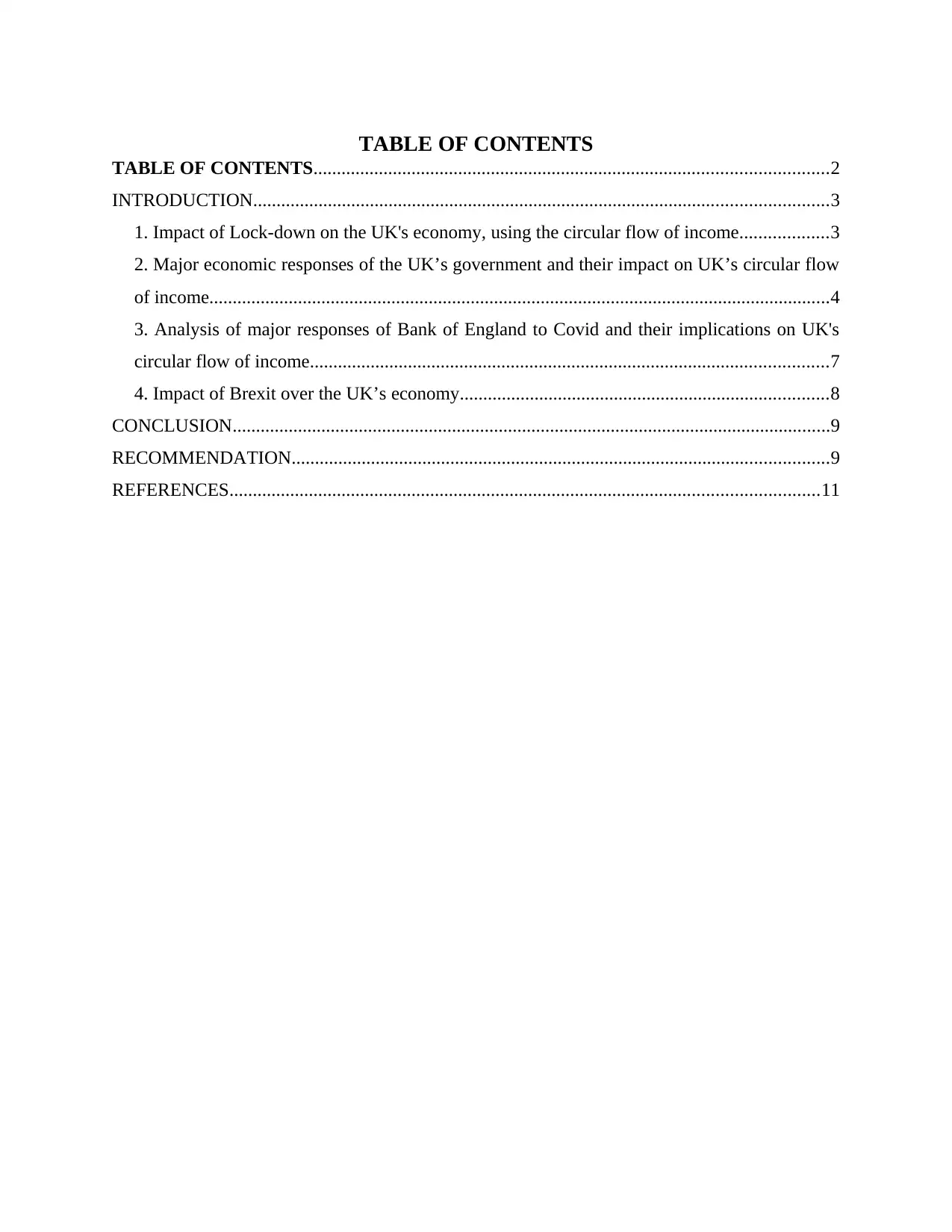
TABLE OF CONTENTS
TABLE OF CONTENTS..............................................................................................................2
INTRODUCTION...........................................................................................................................3
1. Impact of Lock-down on the UK's economy, using the circular flow of income...................3
2. Major economic responses of the UK’s government and their impact on UK’s circular flow
of income.....................................................................................................................................4
3. Analysis of major responses of Bank of England to Covid and their implications on UK's
circular flow of income...............................................................................................................7
4. Impact of Brexit over the UK’s economy...............................................................................8
CONCLUSION................................................................................................................................9
RECOMMENDATION...................................................................................................................9
REFERENCES..............................................................................................................................11
TABLE OF CONTENTS..............................................................................................................2
INTRODUCTION...........................................................................................................................3
1. Impact of Lock-down on the UK's economy, using the circular flow of income...................3
2. Major economic responses of the UK’s government and their impact on UK’s circular flow
of income.....................................................................................................................................4
3. Analysis of major responses of Bank of England to Covid and their implications on UK's
circular flow of income...............................................................................................................7
4. Impact of Brexit over the UK’s economy...............................................................................8
CONCLUSION................................................................................................................................9
RECOMMENDATION...................................................................................................................9
REFERENCES..............................................................................................................................11
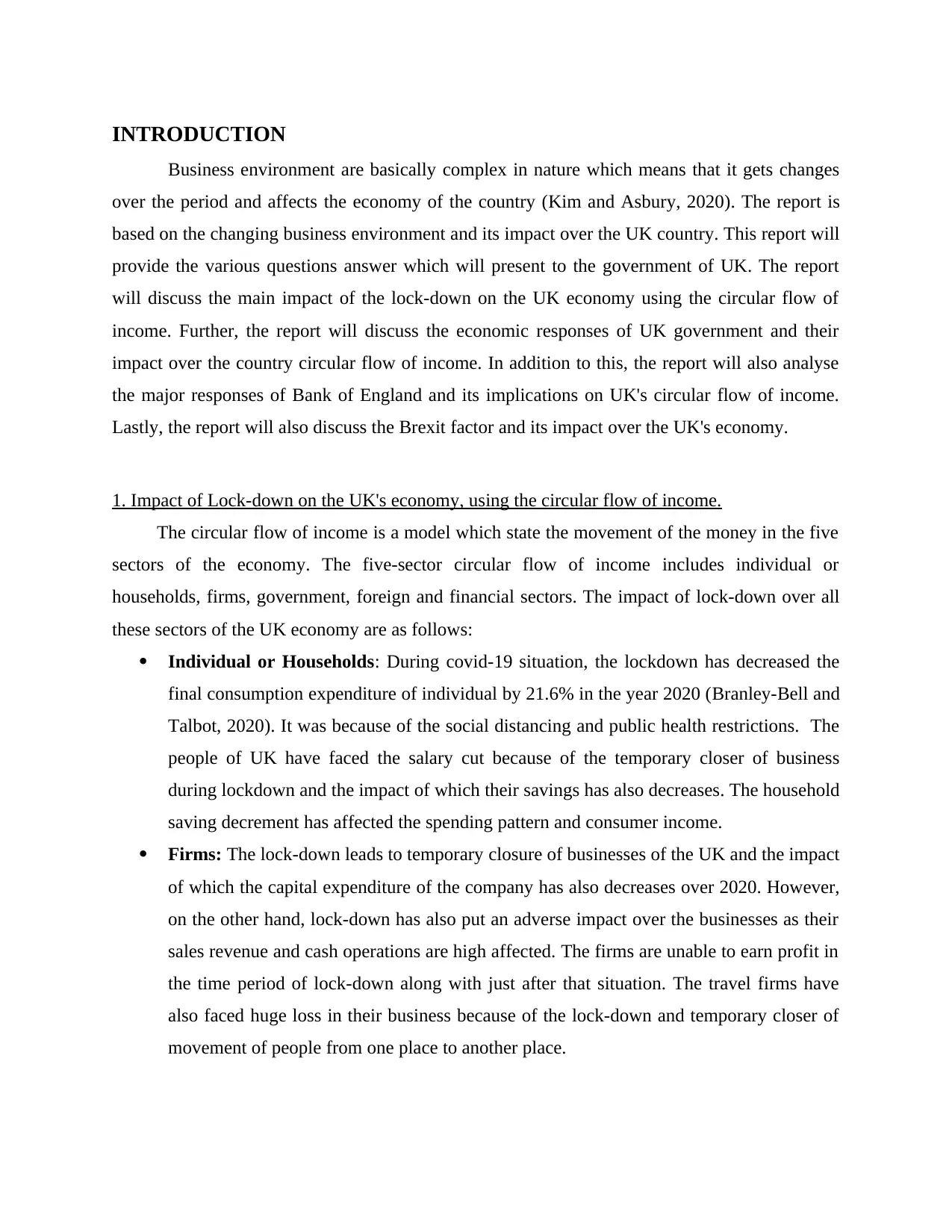
INTRODUCTION
Business environment are basically complex in nature which means that it gets changes
over the period and affects the economy of the country (Kim and Asbury, 2020). The report is
based on the changing business environment and its impact over the UK country. This report will
provide the various questions answer which will present to the government of UK. The report
will discuss the main impact of the lock-down on the UK economy using the circular flow of
income. Further, the report will discuss the economic responses of UK government and their
impact over the country circular flow of income. In addition to this, the report will also analyse
the major responses of Bank of England and its implications on UK's circular flow of income.
Lastly, the report will also discuss the Brexit factor and its impact over the UK's economy.
1. Impact of Lock-down on the UK's economy, using the circular flow of income.
The circular flow of income is a model which state the movement of the money in the five
sectors of the economy. The five-sector circular flow of income includes individual or
households, firms, government, foreign and financial sectors. The impact of lock-down over all
these sectors of the UK economy are as follows:
Individual or Households: During covid-19 situation, the lockdown has decreased the
final consumption expenditure of individual by 21.6% in the year 2020 (Branley-Bell and
Talbot, 2020). It was because of the social distancing and public health restrictions. The
people of UK have faced the salary cut because of the temporary closer of business
during lockdown and the impact of which their savings has also decreases. The household
saving decrement has affected the spending pattern and consumer income.
Firms: The lock-down leads to temporary closure of businesses of the UK and the impact
of which the capital expenditure of the company has also decreases over 2020. However,
on the other hand, lock-down has also put an adverse impact over the businesses as their
sales revenue and cash operations are high affected. The firms are unable to earn profit in
the time period of lock-down along with just after that situation. The travel firms have
also faced huge loss in their business because of the lock-down and temporary closer of
movement of people from one place to another place.
Business environment are basically complex in nature which means that it gets changes
over the period and affects the economy of the country (Kim and Asbury, 2020). The report is
based on the changing business environment and its impact over the UK country. This report will
provide the various questions answer which will present to the government of UK. The report
will discuss the main impact of the lock-down on the UK economy using the circular flow of
income. Further, the report will discuss the economic responses of UK government and their
impact over the country circular flow of income. In addition to this, the report will also analyse
the major responses of Bank of England and its implications on UK's circular flow of income.
Lastly, the report will also discuss the Brexit factor and its impact over the UK's economy.
1. Impact of Lock-down on the UK's economy, using the circular flow of income.
The circular flow of income is a model which state the movement of the money in the five
sectors of the economy. The five-sector circular flow of income includes individual or
households, firms, government, foreign and financial sectors. The impact of lock-down over all
these sectors of the UK economy are as follows:
Individual or Households: During covid-19 situation, the lockdown has decreased the
final consumption expenditure of individual by 21.6% in the year 2020 (Branley-Bell and
Talbot, 2020). It was because of the social distancing and public health restrictions. The
people of UK have faced the salary cut because of the temporary closer of business
during lockdown and the impact of which their savings has also decreases. The household
saving decrement has affected the spending pattern and consumer income.
Firms: The lock-down leads to temporary closure of businesses of the UK and the impact
of which the capital expenditure of the company has also decreases over 2020. However,
on the other hand, lock-down has also put an adverse impact over the businesses as their
sales revenue and cash operations are high affected. The firms are unable to earn profit in
the time period of lock-down along with just after that situation. The travel firms have
also faced huge loss in their business because of the lock-down and temporary closer of
movement of people from one place to another place.
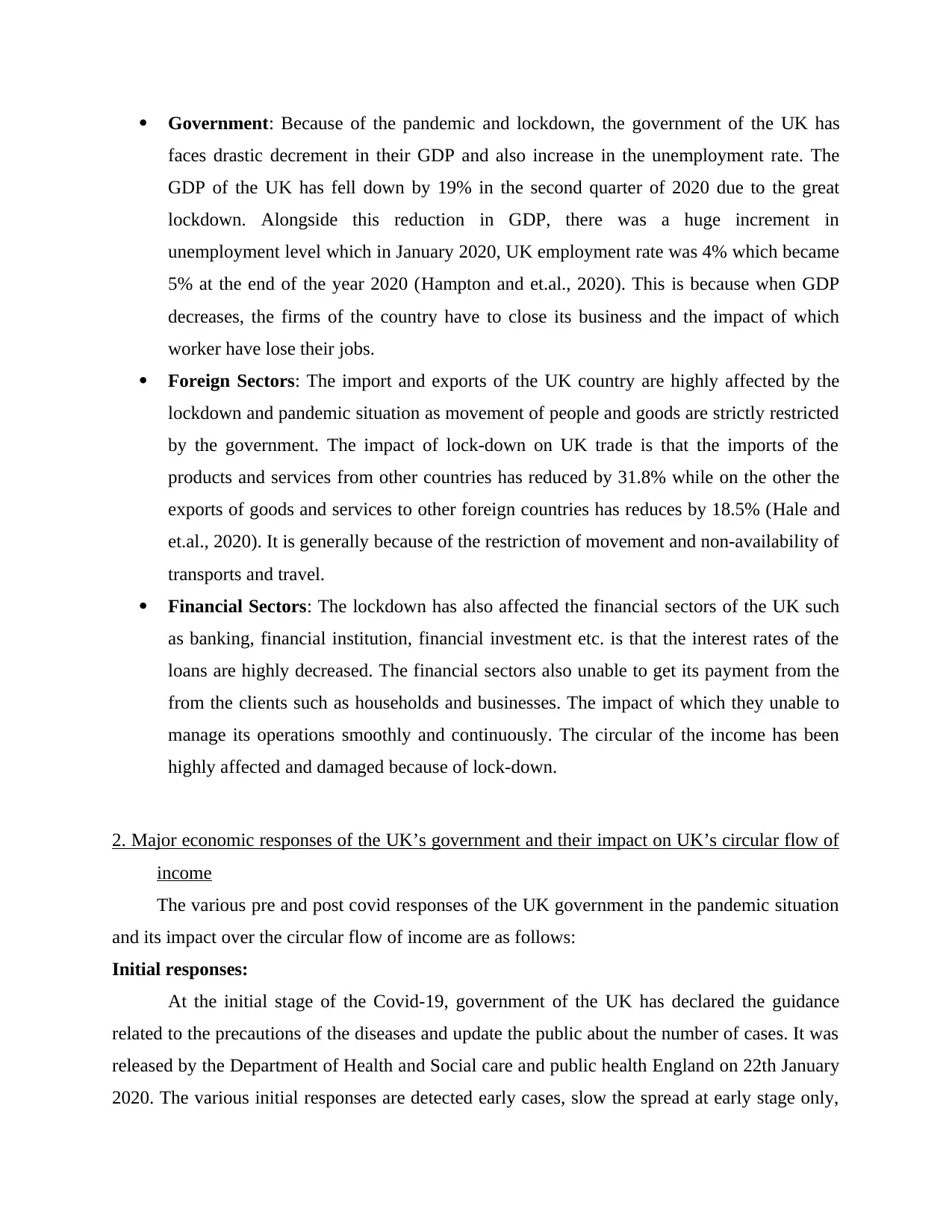
Government: Because of the pandemic and lockdown, the government of the UK has
faces drastic decrement in their GDP and also increase in the unemployment rate. The
GDP of the UK has fell down by 19% in the second quarter of 2020 due to the great
lockdown. Alongside this reduction in GDP, there was a huge increment in
unemployment level which in January 2020, UK employment rate was 4% which became
5% at the end of the year 2020 (Hampton and et.al., 2020). This is because when GDP
decreases, the firms of the country have to close its business and the impact of which
worker have lose their jobs.
Foreign Sectors: The import and exports of the UK country are highly affected by the
lockdown and pandemic situation as movement of people and goods are strictly restricted
by the government. The impact of lock-down on UK trade is that the imports of the
products and services from other countries has reduced by 31.8% while on the other the
exports of goods and services to other foreign countries has reduces by 18.5% (Hale and
et.al., 2020). It is generally because of the restriction of movement and non-availability of
transports and travel.
Financial Sectors: The lockdown has also affected the financial sectors of the UK such
as banking, financial institution, financial investment etc. is that the interest rates of the
loans are highly decreased. The financial sectors also unable to get its payment from the
from the clients such as households and businesses. The impact of which they unable to
manage its operations smoothly and continuously. The circular of the income has been
highly affected and damaged because of lock-down.
2. Major economic responses of the UK’s government and their impact on UK’s circular flow of
income
The various pre and post covid responses of the UK government in the pandemic situation
and its impact over the circular flow of income are as follows:
Initial responses:
At the initial stage of the Covid-19, government of the UK has declared the guidance
related to the precautions of the diseases and update the public about the number of cases. It was
released by the Department of Health and Social care and public health England on 22th January
2020. The various initial responses are detected early cases, slow the spread at early stage only,
faces drastic decrement in their GDP and also increase in the unemployment rate. The
GDP of the UK has fell down by 19% in the second quarter of 2020 due to the great
lockdown. Alongside this reduction in GDP, there was a huge increment in
unemployment level which in January 2020, UK employment rate was 4% which became
5% at the end of the year 2020 (Hampton and et.al., 2020). This is because when GDP
decreases, the firms of the country have to close its business and the impact of which
worker have lose their jobs.
Foreign Sectors: The import and exports of the UK country are highly affected by the
lockdown and pandemic situation as movement of people and goods are strictly restricted
by the government. The impact of lock-down on UK trade is that the imports of the
products and services from other countries has reduced by 31.8% while on the other the
exports of goods and services to other foreign countries has reduces by 18.5% (Hale and
et.al., 2020). It is generally because of the restriction of movement and non-availability of
transports and travel.
Financial Sectors: The lockdown has also affected the financial sectors of the UK such
as banking, financial institution, financial investment etc. is that the interest rates of the
loans are highly decreased. The financial sectors also unable to get its payment from the
from the clients such as households and businesses. The impact of which they unable to
manage its operations smoothly and continuously. The circular of the income has been
highly affected and damaged because of lock-down.
2. Major economic responses of the UK’s government and their impact on UK’s circular flow of
income
The various pre and post covid responses of the UK government in the pandemic situation
and its impact over the circular flow of income are as follows:
Initial responses:
At the initial stage of the Covid-19, government of the UK has declared the guidance
related to the precautions of the diseases and update the public about the number of cases. It was
released by the Department of Health and Social care and public health England on 22th January
2020. The various initial responses are detected early cases, slow the spread at early stage only,
Secure Best Marks with AI Grader
Need help grading? Try our AI Grader for instant feedback on your assignments.
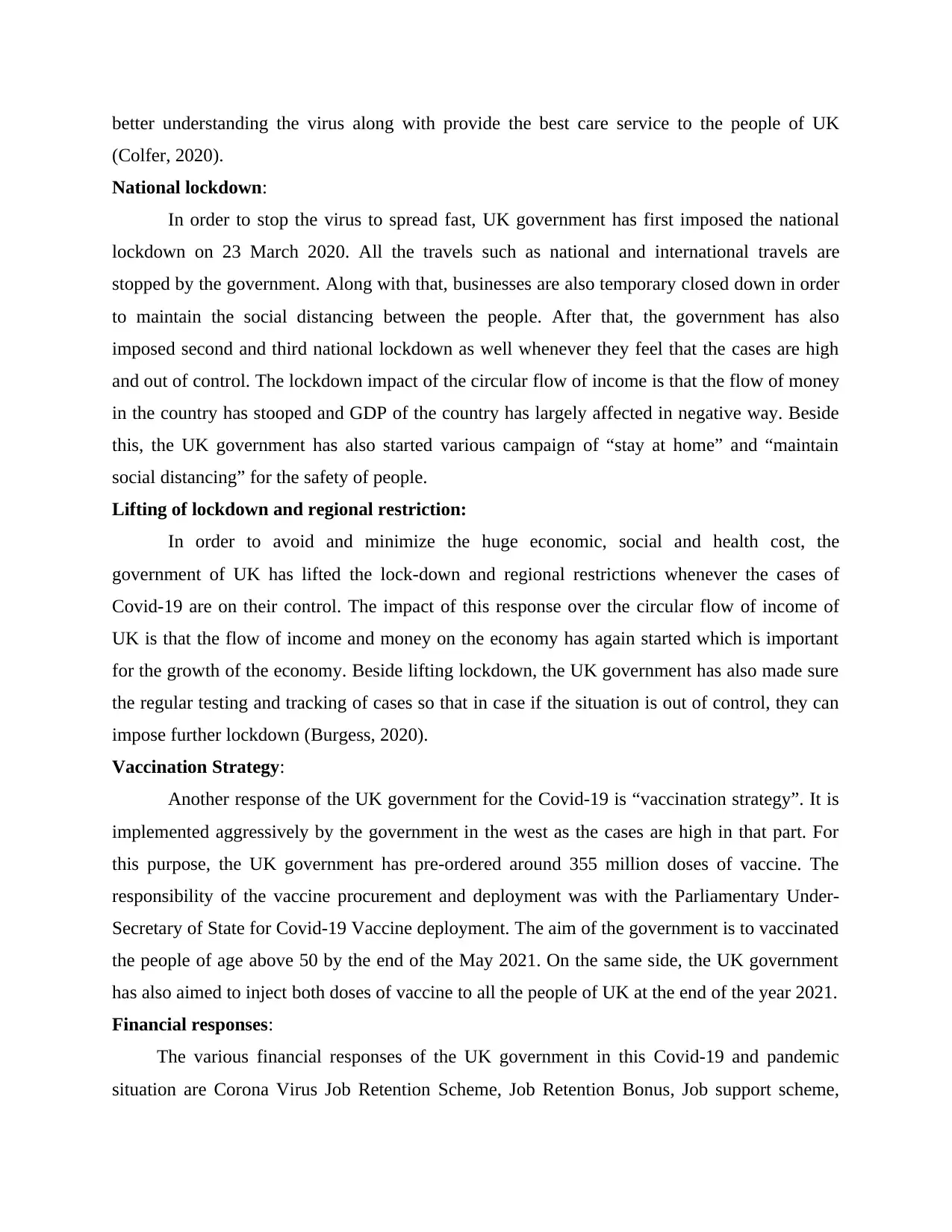
better understanding the virus along with provide the best care service to the people of UK
(Colfer, 2020).
National lockdown:
In order to stop the virus to spread fast, UK government has first imposed the national
lockdown on 23 March 2020. All the travels such as national and international travels are
stopped by the government. Along with that, businesses are also temporary closed down in order
to maintain the social distancing between the people. After that, the government has also
imposed second and third national lockdown as well whenever they feel that the cases are high
and out of control. The lockdown impact of the circular flow of income is that the flow of money
in the country has stooped and GDP of the country has largely affected in negative way. Beside
this, the UK government has also started various campaign of “stay at home” and “maintain
social distancing” for the safety of people.
Lifting of lockdown and regional restriction:
In order to avoid and minimize the huge economic, social and health cost, the
government of UK has lifted the lock-down and regional restrictions whenever the cases of
Covid-19 are on their control. The impact of this response over the circular flow of income of
UK is that the flow of income and money on the economy has again started which is important
for the growth of the economy. Beside lifting lockdown, the UK government has also made sure
the regular testing and tracking of cases so that in case if the situation is out of control, they can
impose further lockdown (Burgess, 2020).
Vaccination Strategy:
Another response of the UK government for the Covid-19 is “vaccination strategy”. It is
implemented aggressively by the government in the west as the cases are high in that part. For
this purpose, the UK government has pre-ordered around 355 million doses of vaccine. The
responsibility of the vaccine procurement and deployment was with the Parliamentary Under-
Secretary of State for Covid-19 Vaccine deployment. The aim of the government is to vaccinated
the people of age above 50 by the end of the May 2021. On the same side, the UK government
has also aimed to inject both doses of vaccine to all the people of UK at the end of the year 2021.
Financial responses:
The various financial responses of the UK government in this Covid-19 and pandemic
situation are Corona Virus Job Retention Scheme, Job Retention Bonus, Job support scheme,
(Colfer, 2020).
National lockdown:
In order to stop the virus to spread fast, UK government has first imposed the national
lockdown on 23 March 2020. All the travels such as national and international travels are
stopped by the government. Along with that, businesses are also temporary closed down in order
to maintain the social distancing between the people. After that, the government has also
imposed second and third national lockdown as well whenever they feel that the cases are high
and out of control. The lockdown impact of the circular flow of income is that the flow of money
in the country has stooped and GDP of the country has largely affected in negative way. Beside
this, the UK government has also started various campaign of “stay at home” and “maintain
social distancing” for the safety of people.
Lifting of lockdown and regional restriction:
In order to avoid and minimize the huge economic, social and health cost, the
government of UK has lifted the lock-down and regional restrictions whenever the cases of
Covid-19 are on their control. The impact of this response over the circular flow of income of
UK is that the flow of income and money on the economy has again started which is important
for the growth of the economy. Beside lifting lockdown, the UK government has also made sure
the regular testing and tracking of cases so that in case if the situation is out of control, they can
impose further lockdown (Burgess, 2020).
Vaccination Strategy:
Another response of the UK government for the Covid-19 is “vaccination strategy”. It is
implemented aggressively by the government in the west as the cases are high in that part. For
this purpose, the UK government has pre-ordered around 355 million doses of vaccine. The
responsibility of the vaccine procurement and deployment was with the Parliamentary Under-
Secretary of State for Covid-19 Vaccine deployment. The aim of the government is to vaccinated
the people of age above 50 by the end of the May 2021. On the same side, the UK government
has also aimed to inject both doses of vaccine to all the people of UK at the end of the year 2021.
Financial responses:
The various financial responses of the UK government in this Covid-19 and pandemic
situation are Corona Virus Job Retention Scheme, Job Retention Bonus, Job support scheme,
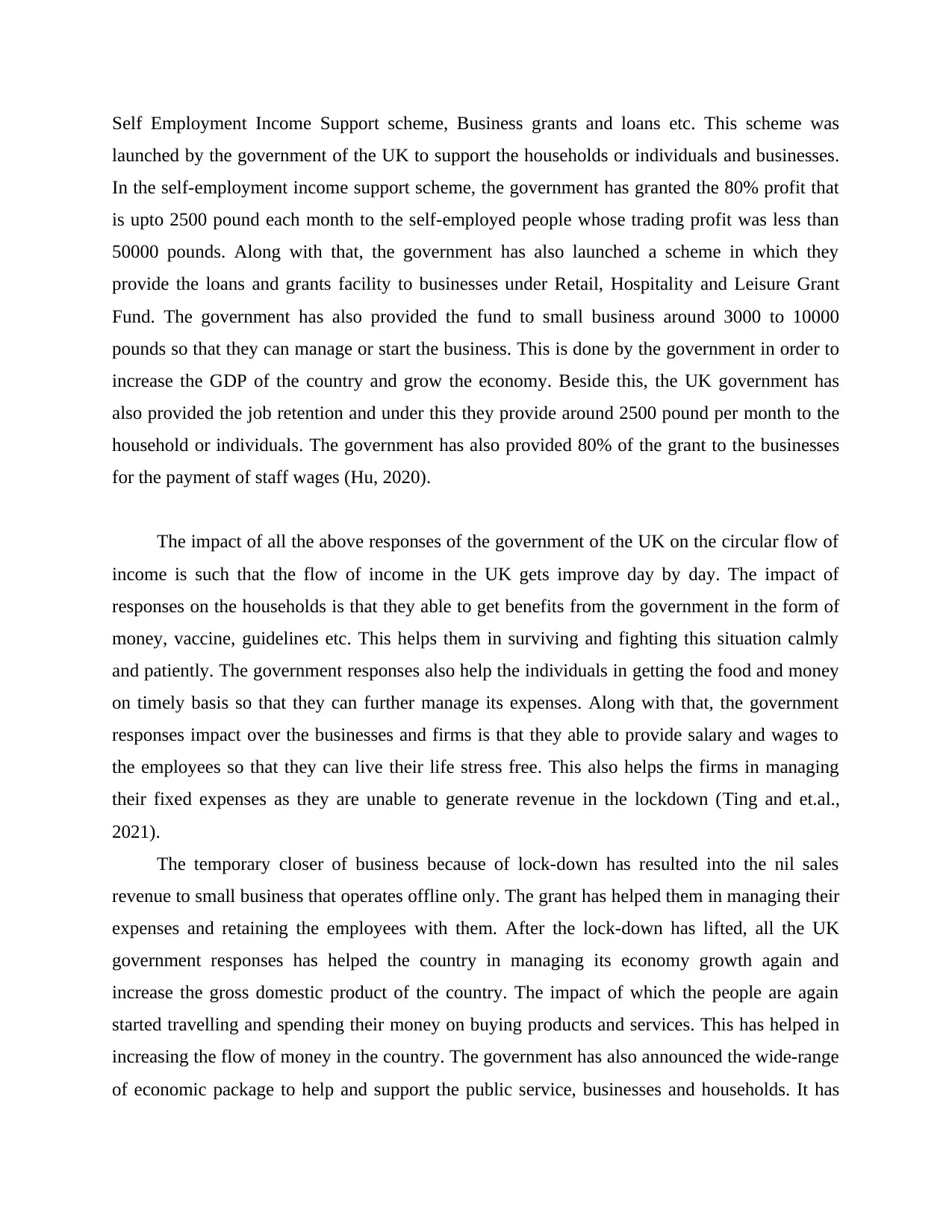
Self Employment Income Support scheme, Business grants and loans etc. This scheme was
launched by the government of the UK to support the households or individuals and businesses.
In the self-employment income support scheme, the government has granted the 80% profit that
is upto 2500 pound each month to the self-employed people whose trading profit was less than
50000 pounds. Along with that, the government has also launched a scheme in which they
provide the loans and grants facility to businesses under Retail, Hospitality and Leisure Grant
Fund. The government has also provided the fund to small business around 3000 to 10000
pounds so that they can manage or start the business. This is done by the government in order to
increase the GDP of the country and grow the economy. Beside this, the UK government has
also provided the job retention and under this they provide around 2500 pound per month to the
household or individuals. The government has also provided 80% of the grant to the businesses
for the payment of staff wages (Hu, 2020).
The impact of all the above responses of the government of the UK on the circular flow of
income is such that the flow of income in the UK gets improve day by day. The impact of
responses on the households is that they able to get benefits from the government in the form of
money, vaccine, guidelines etc. This helps them in surviving and fighting this situation calmly
and patiently. The government responses also help the individuals in getting the food and money
on timely basis so that they can further manage its expenses. Along with that, the government
responses impact over the businesses and firms is that they able to provide salary and wages to
the employees so that they can live their life stress free. This also helps the firms in managing
their fixed expenses as they are unable to generate revenue in the lockdown (Ting and et.al.,
2021).
The temporary closer of business because of lock-down has resulted into the nil sales
revenue to small business that operates offline only. The grant has helped them in managing their
expenses and retaining the employees with them. After the lock-down has lifted, all the UK
government responses has helped the country in managing its economy growth again and
increase the gross domestic product of the country. The impact of which the people are again
started travelling and spending their money on buying products and services. This has helped in
increasing the flow of money in the country. The government has also announced the wide-range
of economic package to help and support the public service, businesses and households. It has
launched by the government of the UK to support the households or individuals and businesses.
In the self-employment income support scheme, the government has granted the 80% profit that
is upto 2500 pound each month to the self-employed people whose trading profit was less than
50000 pounds. Along with that, the government has also launched a scheme in which they
provide the loans and grants facility to businesses under Retail, Hospitality and Leisure Grant
Fund. The government has also provided the fund to small business around 3000 to 10000
pounds so that they can manage or start the business. This is done by the government in order to
increase the GDP of the country and grow the economy. Beside this, the UK government has
also provided the job retention and under this they provide around 2500 pound per month to the
household or individuals. The government has also provided 80% of the grant to the businesses
for the payment of staff wages (Hu, 2020).
The impact of all the above responses of the government of the UK on the circular flow of
income is such that the flow of income in the UK gets improve day by day. The impact of
responses on the households is that they able to get benefits from the government in the form of
money, vaccine, guidelines etc. This helps them in surviving and fighting this situation calmly
and patiently. The government responses also help the individuals in getting the food and money
on timely basis so that they can further manage its expenses. Along with that, the government
responses impact over the businesses and firms is that they able to provide salary and wages to
the employees so that they can live their life stress free. This also helps the firms in managing
their fixed expenses as they are unable to generate revenue in the lockdown (Ting and et.al.,
2021).
The temporary closer of business because of lock-down has resulted into the nil sales
revenue to small business that operates offline only. The grant has helped them in managing their
expenses and retaining the employees with them. After the lock-down has lifted, all the UK
government responses has helped the country in managing its economy growth again and
increase the gross domestic product of the country. The impact of which the people are again
started travelling and spending their money on buying products and services. This has helped in
increasing the flow of money in the country. The government has also announced the wide-range
of economic package to help and support the public service, businesses and households. It has
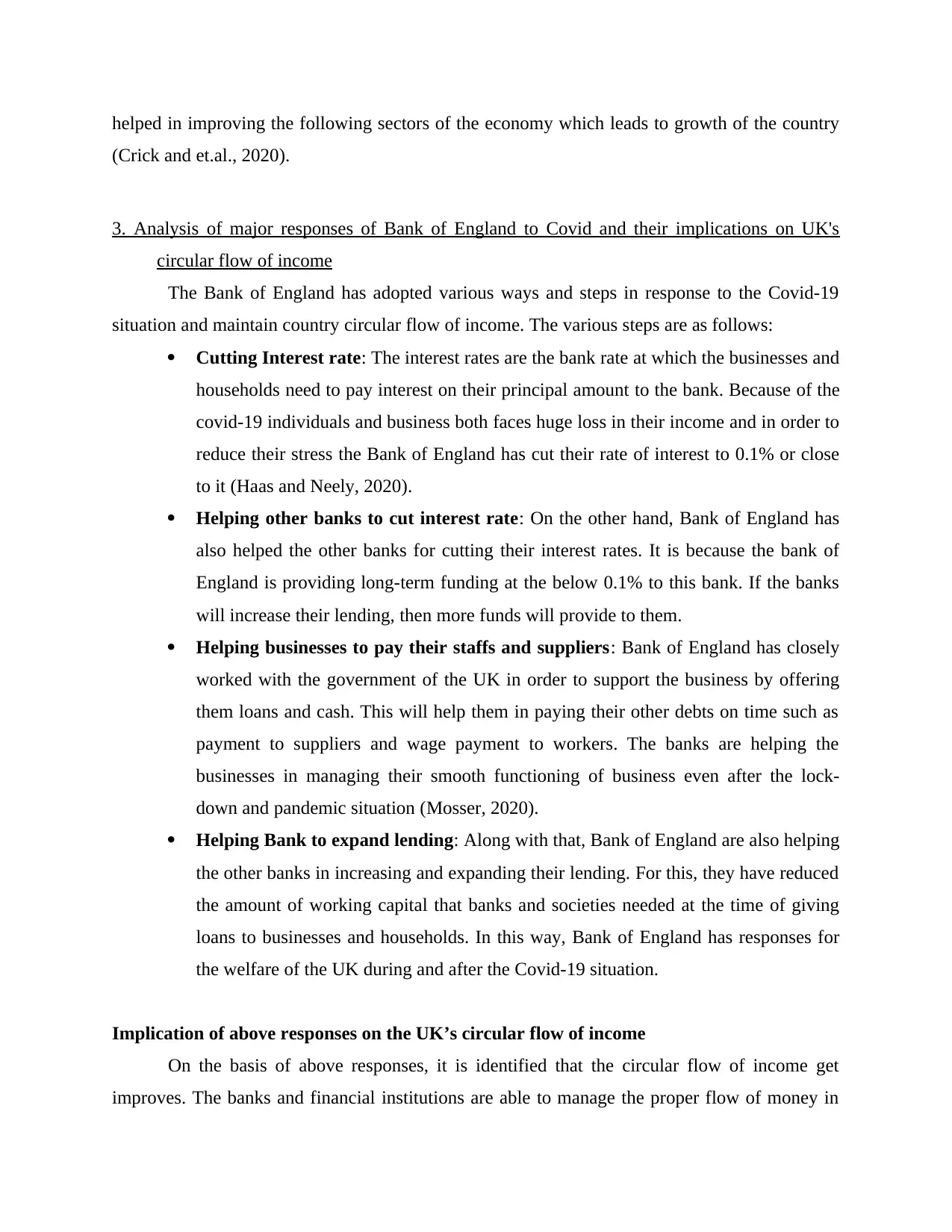
helped in improving the following sectors of the economy which leads to growth of the country
(Crick and et.al., 2020).
3. Analysis of major responses of Bank of England to Covid and their implications on UK's
circular flow of income
The Bank of England has adopted various ways and steps in response to the Covid-19
situation and maintain country circular flow of income. The various steps are as follows:
Cutting Interest rate: The interest rates are the bank rate at which the businesses and
households need to pay interest on their principal amount to the bank. Because of the
covid-19 individuals and business both faces huge loss in their income and in order to
reduce their stress the Bank of England has cut their rate of interest to 0.1% or close
to it (Haas and Neely, 2020).
Helping other banks to cut interest rate: On the other hand, Bank of England has
also helped the other banks for cutting their interest rates. It is because the bank of
England is providing long-term funding at the below 0.1% to this bank. If the banks
will increase their lending, then more funds will provide to them.
Helping businesses to pay their staffs and suppliers: Bank of England has closely
worked with the government of the UK in order to support the business by offering
them loans and cash. This will help them in paying their other debts on time such as
payment to suppliers and wage payment to workers. The banks are helping the
businesses in managing their smooth functioning of business even after the lock-
down and pandemic situation (Mosser, 2020).
Helping Bank to expand lending: Along with that, Bank of England are also helping
the other banks in increasing and expanding their lending. For this, they have reduced
the amount of working capital that banks and societies needed at the time of giving
loans to businesses and households. In this way, Bank of England has responses for
the welfare of the UK during and after the Covid-19 situation.
Implication of above responses on the UK’s circular flow of income
On the basis of above responses, it is identified that the circular flow of income get
improves. The banks and financial institutions are able to manage the proper flow of money in
(Crick and et.al., 2020).
3. Analysis of major responses of Bank of England to Covid and their implications on UK's
circular flow of income
The Bank of England has adopted various ways and steps in response to the Covid-19
situation and maintain country circular flow of income. The various steps are as follows:
Cutting Interest rate: The interest rates are the bank rate at which the businesses and
households need to pay interest on their principal amount to the bank. Because of the
covid-19 individuals and business both faces huge loss in their income and in order to
reduce their stress the Bank of England has cut their rate of interest to 0.1% or close
to it (Haas and Neely, 2020).
Helping other banks to cut interest rate: On the other hand, Bank of England has
also helped the other banks for cutting their interest rates. It is because the bank of
England is providing long-term funding at the below 0.1% to this bank. If the banks
will increase their lending, then more funds will provide to them.
Helping businesses to pay their staffs and suppliers: Bank of England has closely
worked with the government of the UK in order to support the business by offering
them loans and cash. This will help them in paying their other debts on time such as
payment to suppliers and wage payment to workers. The banks are helping the
businesses in managing their smooth functioning of business even after the lock-
down and pandemic situation (Mosser, 2020).
Helping Bank to expand lending: Along with that, Bank of England are also helping
the other banks in increasing and expanding their lending. For this, they have reduced
the amount of working capital that banks and societies needed at the time of giving
loans to businesses and households. In this way, Bank of England has responses for
the welfare of the UK during and after the Covid-19 situation.
Implication of above responses on the UK’s circular flow of income
On the basis of above responses, it is identified that the circular flow of income get
improves. The banks and financial institutions are able to manage the proper flow of money in
Paraphrase This Document
Need a fresh take? Get an instant paraphrase of this document with our AI Paraphraser
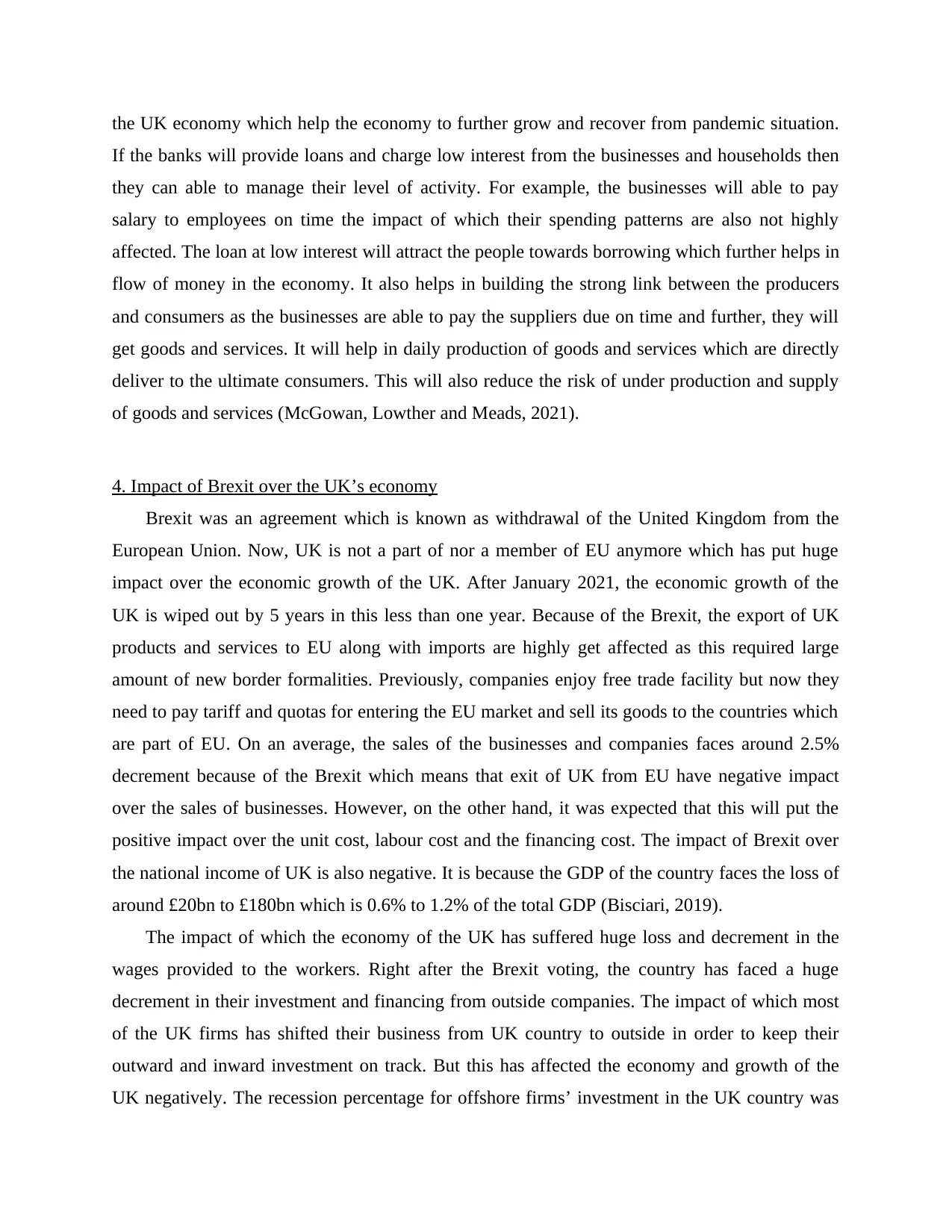
the UK economy which help the economy to further grow and recover from pandemic situation.
If the banks will provide loans and charge low interest from the businesses and households then
they can able to manage their level of activity. For example, the businesses will able to pay
salary to employees on time the impact of which their spending patterns are also not highly
affected. The loan at low interest will attract the people towards borrowing which further helps in
flow of money in the economy. It also helps in building the strong link between the producers
and consumers as the businesses are able to pay the suppliers due on time and further, they will
get goods and services. It will help in daily production of goods and services which are directly
deliver to the ultimate consumers. This will also reduce the risk of under production and supply
of goods and services (McGowan, Lowther and Meads, 2021).
4. Impact of Brexit over the UK’s economy
Brexit was an agreement which is known as withdrawal of the United Kingdom from the
European Union. Now, UK is not a part of nor a member of EU anymore which has put huge
impact over the economic growth of the UK. After January 2021, the economic growth of the
UK is wiped out by 5 years in this less than one year. Because of the Brexit, the export of UK
products and services to EU along with imports are highly get affected as this required large
amount of new border formalities. Previously, companies enjoy free trade facility but now they
need to pay tariff and quotas for entering the EU market and sell its goods to the countries which
are part of EU. On an average, the sales of the businesses and companies faces around 2.5%
decrement because of the Brexit which means that exit of UK from EU have negative impact
over the sales of businesses. However, on the other hand, it was expected that this will put the
positive impact over the unit cost, labour cost and the financing cost. The impact of Brexit over
the national income of UK is also negative. It is because the GDP of the country faces the loss of
around £20bn to £180bn which is 0.6% to 1.2% of the total GDP (Bisciari, 2019).
The impact of which the economy of the UK has suffered huge loss and decrement in the
wages provided to the workers. Right after the Brexit voting, the country has faced a huge
decrement in their investment and financing from outside companies. The impact of which most
of the UK firms has shifted their business from UK country to outside in order to keep their
outward and inward investment on track. But this has affected the economy and growth of the
UK negatively. The recession percentage for offshore firms’ investment in the UK country was
If the banks will provide loans and charge low interest from the businesses and households then
they can able to manage their level of activity. For example, the businesses will able to pay
salary to employees on time the impact of which their spending patterns are also not highly
affected. The loan at low interest will attract the people towards borrowing which further helps in
flow of money in the economy. It also helps in building the strong link between the producers
and consumers as the businesses are able to pay the suppliers due on time and further, they will
get goods and services. It will help in daily production of goods and services which are directly
deliver to the ultimate consumers. This will also reduce the risk of under production and supply
of goods and services (McGowan, Lowther and Meads, 2021).
4. Impact of Brexit over the UK’s economy
Brexit was an agreement which is known as withdrawal of the United Kingdom from the
European Union. Now, UK is not a part of nor a member of EU anymore which has put huge
impact over the economic growth of the UK. After January 2021, the economic growth of the
UK is wiped out by 5 years in this less than one year. Because of the Brexit, the export of UK
products and services to EU along with imports are highly get affected as this required large
amount of new border formalities. Previously, companies enjoy free trade facility but now they
need to pay tariff and quotas for entering the EU market and sell its goods to the countries which
are part of EU. On an average, the sales of the businesses and companies faces around 2.5%
decrement because of the Brexit which means that exit of UK from EU have negative impact
over the sales of businesses. However, on the other hand, it was expected that this will put the
positive impact over the unit cost, labour cost and the financing cost. The impact of Brexit over
the national income of UK is also negative. It is because the GDP of the country faces the loss of
around £20bn to £180bn which is 0.6% to 1.2% of the total GDP (Bisciari, 2019).
The impact of which the economy of the UK has suffered huge loss and decrement in the
wages provided to the workers. Right after the Brexit voting, the country has faced a huge
decrement in their investment and financing from outside companies. The impact of which most
of the UK firms has shifted their business from UK country to outside in order to keep their
outward and inward investment on track. But this has affected the economy and growth of the
UK negatively. The recession percentage for offshore firms’ investment in the UK country was
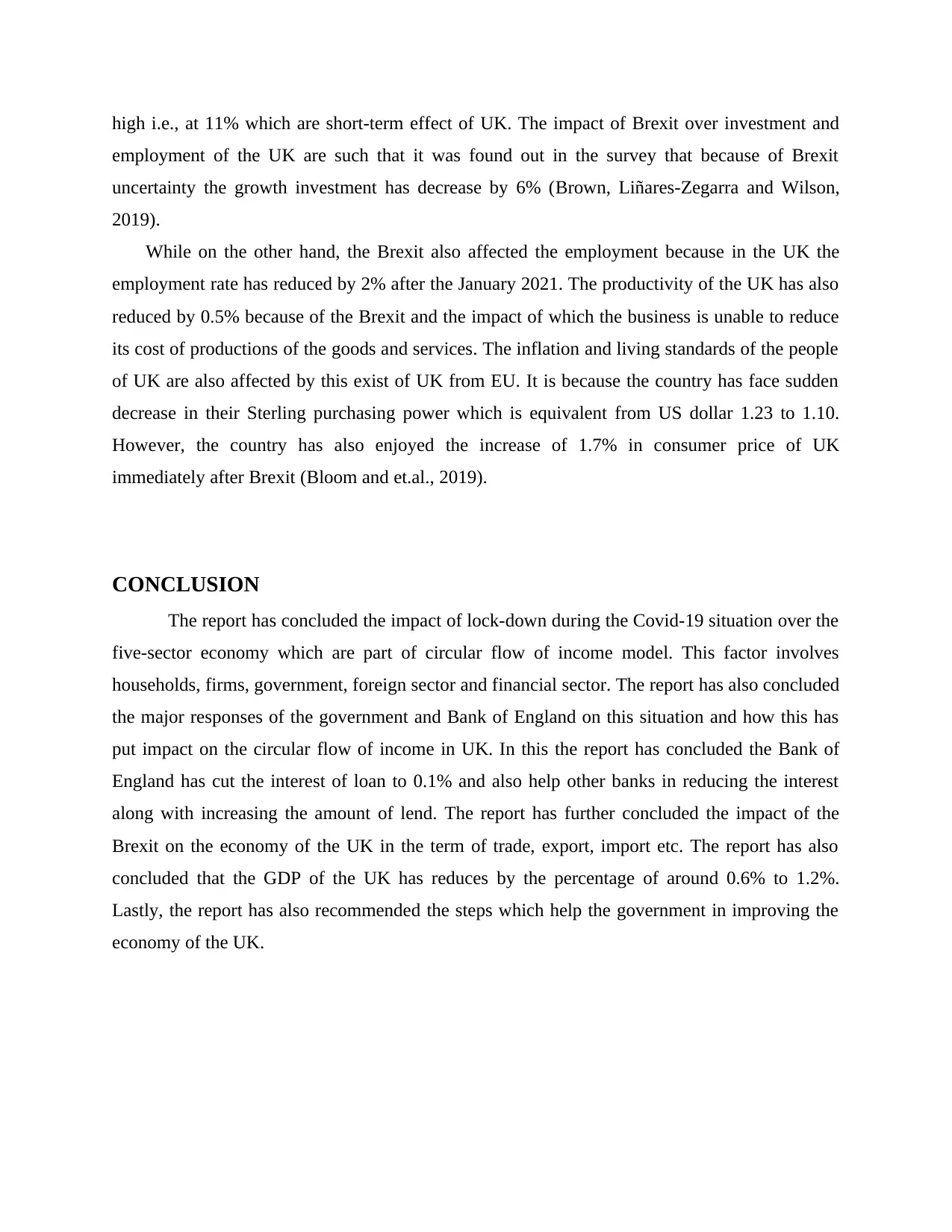
high i.e., at 11% which are short-term effect of UK. The impact of Brexit over investment and
employment of the UK are such that it was found out in the survey that because of Brexit
uncertainty the growth investment has decrease by 6% (Brown, Liñares-Zegarra and Wilson,
2019).
While on the other hand, the Brexit also affected the employment because in the UK the
employment rate has reduced by 2% after the January 2021. The productivity of the UK has also
reduced by 0.5% because of the Brexit and the impact of which the business is unable to reduce
its cost of productions of the goods and services. The inflation and living standards of the people
of UK are also affected by this exist of UK from EU. It is because the country has face sudden
decrease in their Sterling purchasing power which is equivalent from US dollar 1.23 to 1.10.
However, the country has also enjoyed the increase of 1.7% in consumer price of UK
immediately after Brexit (Bloom and et.al., 2019).
CONCLUSION
The report has concluded the impact of lock-down during the Covid-19 situation over the
five-sector economy which are part of circular flow of income model. This factor involves
households, firms, government, foreign sector and financial sector. The report has also concluded
the major responses of the government and Bank of England on this situation and how this has
put impact on the circular flow of income in UK. In this the report has concluded the Bank of
England has cut the interest of loan to 0.1% and also help other banks in reducing the interest
along with increasing the amount of lend. The report has further concluded the impact of the
Brexit on the economy of the UK in the term of trade, export, import etc. The report has also
concluded that the GDP of the UK has reduces by the percentage of around 0.6% to 1.2%.
Lastly, the report has also recommended the steps which help the government in improving the
economy of the UK.
employment of the UK are such that it was found out in the survey that because of Brexit
uncertainty the growth investment has decrease by 6% (Brown, Liñares-Zegarra and Wilson,
2019).
While on the other hand, the Brexit also affected the employment because in the UK the
employment rate has reduced by 2% after the January 2021. The productivity of the UK has also
reduced by 0.5% because of the Brexit and the impact of which the business is unable to reduce
its cost of productions of the goods and services. The inflation and living standards of the people
of UK are also affected by this exist of UK from EU. It is because the country has face sudden
decrease in their Sterling purchasing power which is equivalent from US dollar 1.23 to 1.10.
However, the country has also enjoyed the increase of 1.7% in consumer price of UK
immediately after Brexit (Bloom and et.al., 2019).
CONCLUSION
The report has concluded the impact of lock-down during the Covid-19 situation over the
five-sector economy which are part of circular flow of income model. This factor involves
households, firms, government, foreign sector and financial sector. The report has also concluded
the major responses of the government and Bank of England on this situation and how this has
put impact on the circular flow of income in UK. In this the report has concluded the Bank of
England has cut the interest of loan to 0.1% and also help other banks in reducing the interest
along with increasing the amount of lend. The report has further concluded the impact of the
Brexit on the economy of the UK in the term of trade, export, import etc. The report has also
concluded that the GDP of the UK has reduces by the percentage of around 0.6% to 1.2%.
Lastly, the report has also recommended the steps which help the government in improving the
economy of the UK.
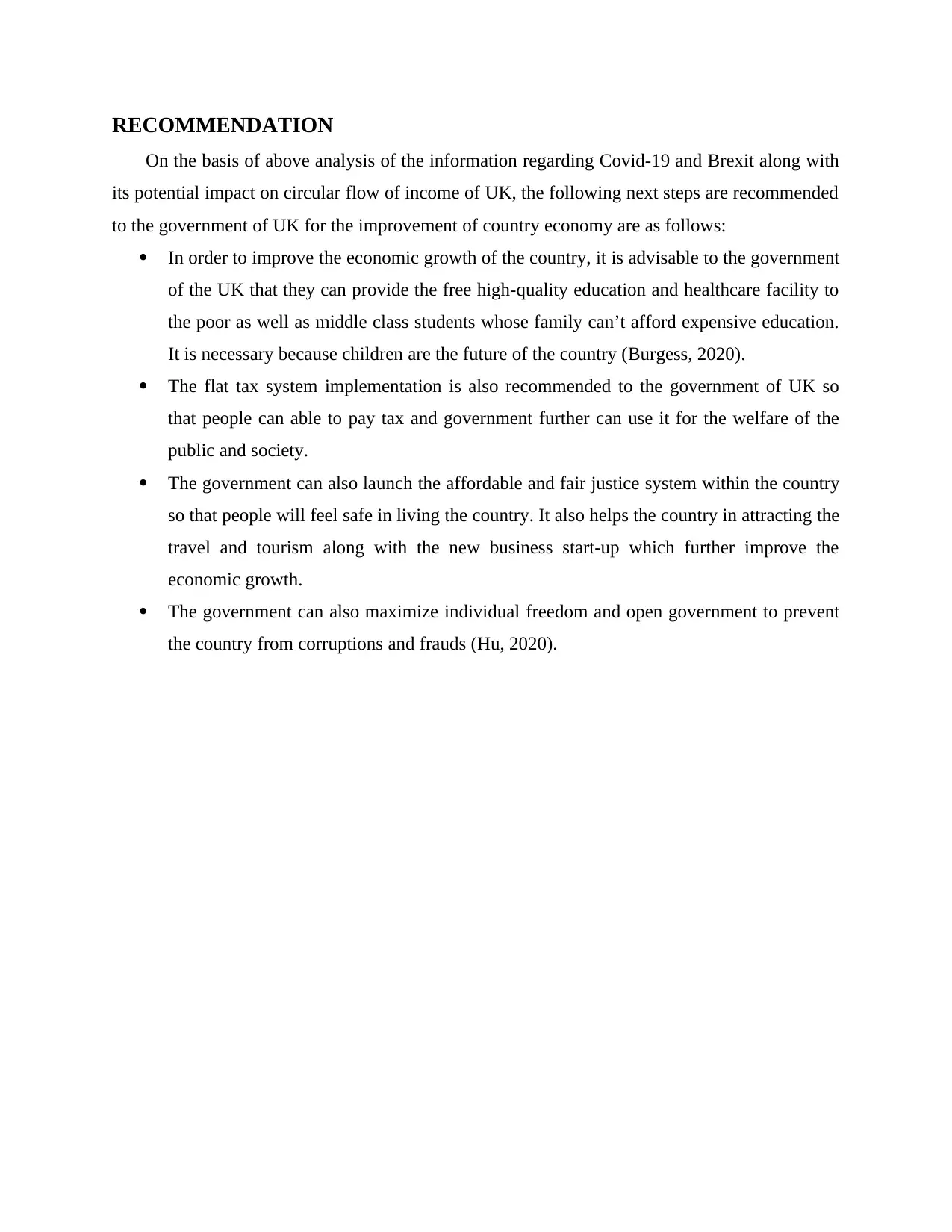
RECOMMENDATION
On the basis of above analysis of the information regarding Covid-19 and Brexit along with
its potential impact on circular flow of income of UK, the following next steps are recommended
to the government of UK for the improvement of country economy are as follows:
In order to improve the economic growth of the country, it is advisable to the government
of the UK that they can provide the free high-quality education and healthcare facility to
the poor as well as middle class students whose family can’t afford expensive education.
It is necessary because children are the future of the country (Burgess, 2020).
The flat tax system implementation is also recommended to the government of UK so
that people can able to pay tax and government further can use it for the welfare of the
public and society.
The government can also launch the affordable and fair justice system within the country
so that people will feel safe in living the country. It also helps the country in attracting the
travel and tourism along with the new business start-up which further improve the
economic growth.
The government can also maximize individual freedom and open government to prevent
the country from corruptions and frauds (Hu, 2020).
On the basis of above analysis of the information regarding Covid-19 and Brexit along with
its potential impact on circular flow of income of UK, the following next steps are recommended
to the government of UK for the improvement of country economy are as follows:
In order to improve the economic growth of the country, it is advisable to the government
of the UK that they can provide the free high-quality education and healthcare facility to
the poor as well as middle class students whose family can’t afford expensive education.
It is necessary because children are the future of the country (Burgess, 2020).
The flat tax system implementation is also recommended to the government of UK so
that people can able to pay tax and government further can use it for the welfare of the
public and society.
The government can also launch the affordable and fair justice system within the country
so that people will feel safe in living the country. It also helps the country in attracting the
travel and tourism along with the new business start-up which further improve the
economic growth.
The government can also maximize individual freedom and open government to prevent
the country from corruptions and frauds (Hu, 2020).
Secure Best Marks with AI Grader
Need help grading? Try our AI Grader for instant feedback on your assignments.
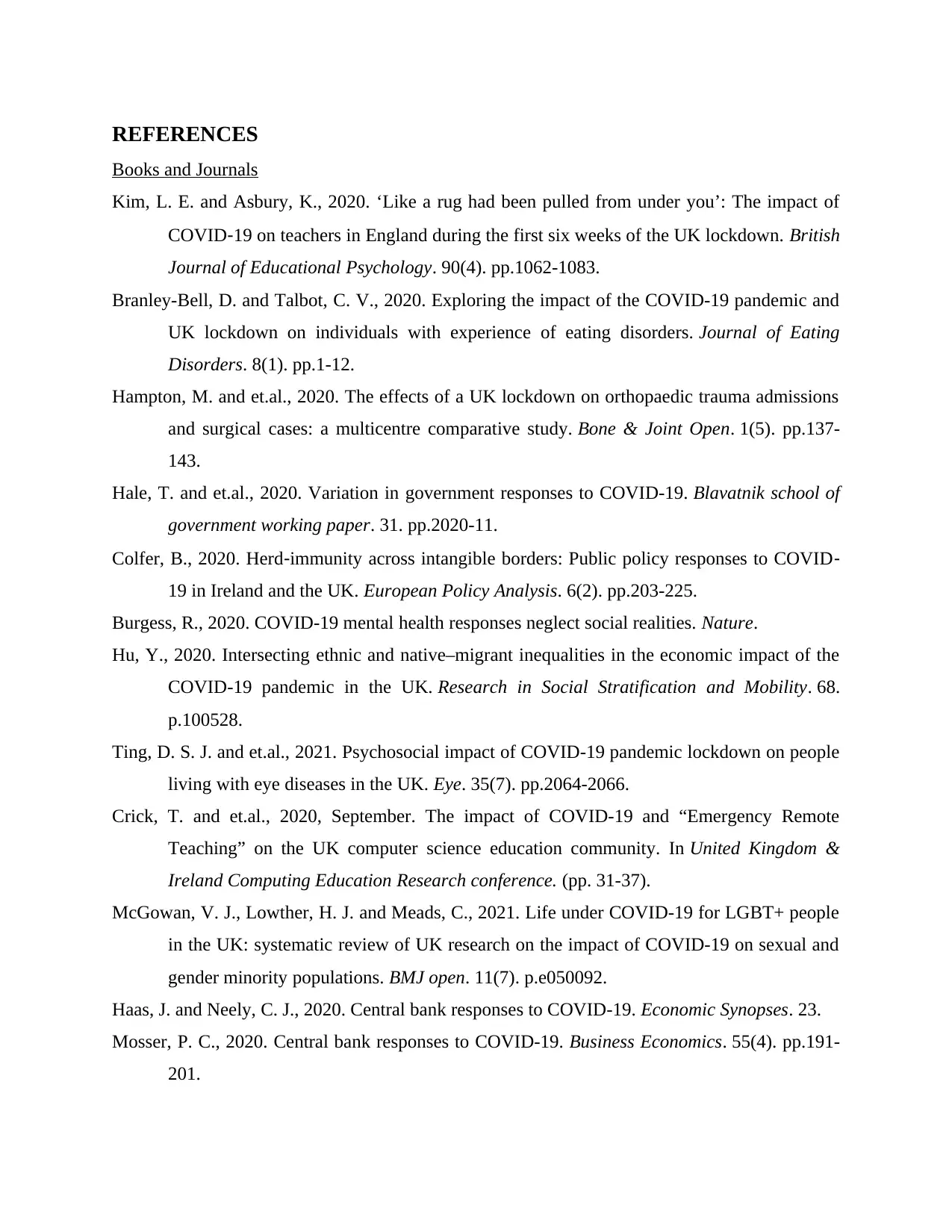
REFERENCES
Books and Journals
Kim, L. E. and Asbury, K., 2020. ‘Like a rug had been pulled from under you’: The impact of
COVID‐19 on teachers in England during the first six weeks of the UK lockdown. British
Journal of Educational Psychology. 90(4). pp.1062-1083.
Branley-Bell, D. and Talbot, C. V., 2020. Exploring the impact of the COVID-19 pandemic and
UK lockdown on individuals with experience of eating disorders. Journal of Eating
Disorders. 8(1). pp.1-12.
Hampton, M. and et.al., 2020. The effects of a UK lockdown on orthopaedic trauma admissions
and surgical cases: a multicentre comparative study. Bone & Joint Open. 1(5). pp.137-
143.
Hale, T. and et.al., 2020. Variation in government responses to COVID-19. Blavatnik school of
government working paper. 31. pp.2020-11.
Colfer, B., 2020. Herd‐immunity across intangible borders: Public policy responses to COVID‐
19 in Ireland and the UK. European Policy Analysis. 6(2). pp.203-225.
Burgess, R., 2020. COVID-19 mental health responses neglect social realities. Nature.
Hu, Y., 2020. Intersecting ethnic and native–migrant inequalities in the economic impact of the
COVID-19 pandemic in the UK. Research in Social Stratification and Mobility. 68.
p.100528.
Ting, D. S. J. and et.al., 2021. Psychosocial impact of COVID-19 pandemic lockdown on people
living with eye diseases in the UK. Eye. 35(7). pp.2064-2066.
Crick, T. and et.al., 2020, September. The impact of COVID-19 and “Emergency Remote
Teaching” on the UK computer science education community. In United Kingdom &
Ireland Computing Education Research conference. (pp. 31-37).
McGowan, V. J., Lowther, H. J. and Meads, C., 2021. Life under COVID-19 for LGBT+ people
in the UK: systematic review of UK research on the impact of COVID-19 on sexual and
gender minority populations. BMJ open. 11(7). p.e050092.
Haas, J. and Neely, C. J., 2020. Central bank responses to COVID-19. Economic Synopses. 23.
Mosser, P. C., 2020. Central bank responses to COVID-19. Business Economics. 55(4). pp.191-
201.
Books and Journals
Kim, L. E. and Asbury, K., 2020. ‘Like a rug had been pulled from under you’: The impact of
COVID‐19 on teachers in England during the first six weeks of the UK lockdown. British
Journal of Educational Psychology. 90(4). pp.1062-1083.
Branley-Bell, D. and Talbot, C. V., 2020. Exploring the impact of the COVID-19 pandemic and
UK lockdown on individuals with experience of eating disorders. Journal of Eating
Disorders. 8(1). pp.1-12.
Hampton, M. and et.al., 2020. The effects of a UK lockdown on orthopaedic trauma admissions
and surgical cases: a multicentre comparative study. Bone & Joint Open. 1(5). pp.137-
143.
Hale, T. and et.al., 2020. Variation in government responses to COVID-19. Blavatnik school of
government working paper. 31. pp.2020-11.
Colfer, B., 2020. Herd‐immunity across intangible borders: Public policy responses to COVID‐
19 in Ireland and the UK. European Policy Analysis. 6(2). pp.203-225.
Burgess, R., 2020. COVID-19 mental health responses neglect social realities. Nature.
Hu, Y., 2020. Intersecting ethnic and native–migrant inequalities in the economic impact of the
COVID-19 pandemic in the UK. Research in Social Stratification and Mobility. 68.
p.100528.
Ting, D. S. J. and et.al., 2021. Psychosocial impact of COVID-19 pandemic lockdown on people
living with eye diseases in the UK. Eye. 35(7). pp.2064-2066.
Crick, T. and et.al., 2020, September. The impact of COVID-19 and “Emergency Remote
Teaching” on the UK computer science education community. In United Kingdom &
Ireland Computing Education Research conference. (pp. 31-37).
McGowan, V. J., Lowther, H. J. and Meads, C., 2021. Life under COVID-19 for LGBT+ people
in the UK: systematic review of UK research on the impact of COVID-19 on sexual and
gender minority populations. BMJ open. 11(7). p.e050092.
Haas, J. and Neely, C. J., 2020. Central bank responses to COVID-19. Economic Synopses. 23.
Mosser, P. C., 2020. Central bank responses to COVID-19. Business Economics. 55(4). pp.191-
201.
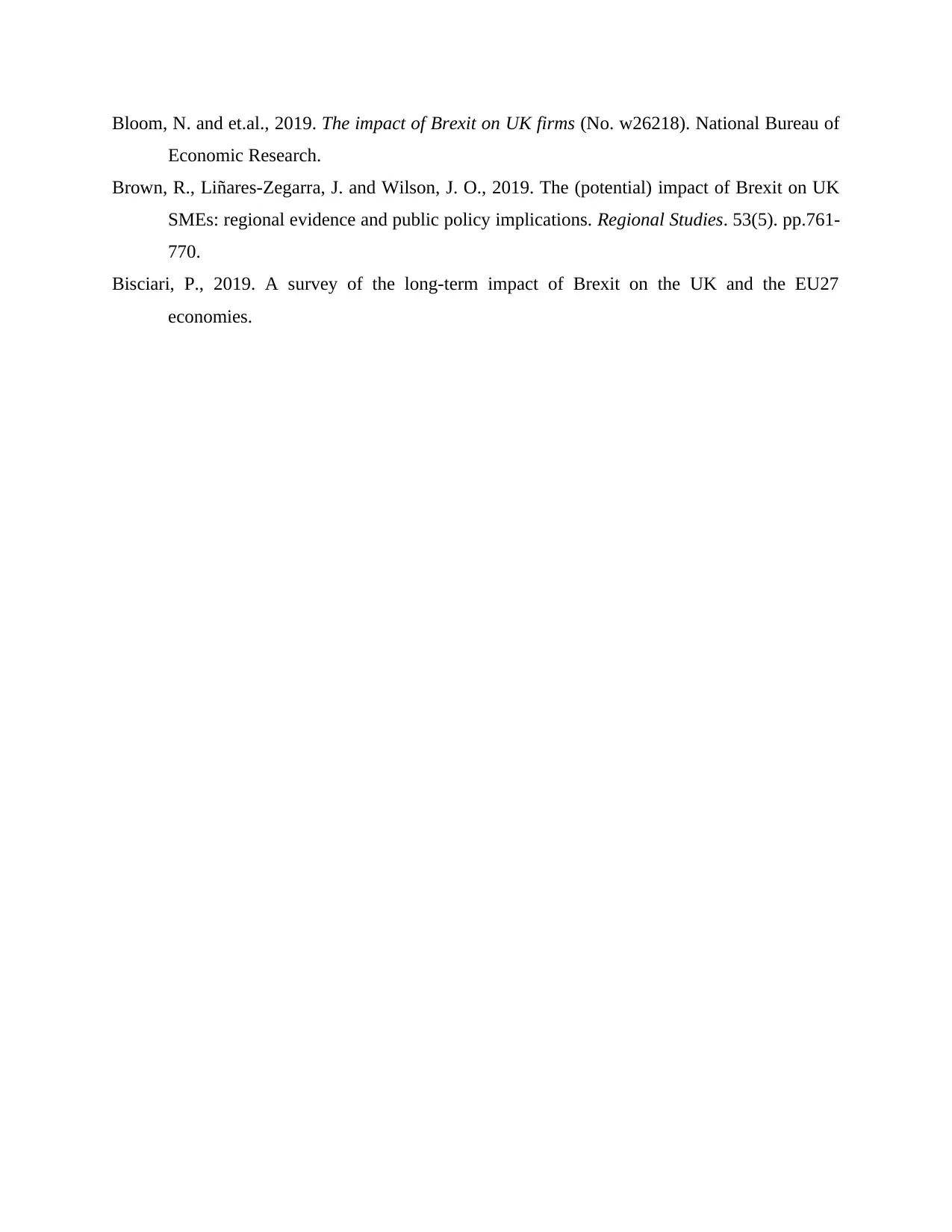
Bloom, N. and et.al., 2019. The impact of Brexit on UK firms (No. w26218). National Bureau of
Economic Research.
Brown, R., Liñares-Zegarra, J. and Wilson, J. O., 2019. The (potential) impact of Brexit on UK
SMEs: regional evidence and public policy implications. Regional Studies. 53(5). pp.761-
770.
Bisciari, P., 2019. A survey of the long-term impact of Brexit on the UK and the EU27
economies.
Economic Research.
Brown, R., Liñares-Zegarra, J. and Wilson, J. O., 2019. The (potential) impact of Brexit on UK
SMEs: regional evidence and public policy implications. Regional Studies. 53(5). pp.761-
770.
Bisciari, P., 2019. A survey of the long-term impact of Brexit on the UK and the EU27
economies.
1 out of 12
Related Documents
Your All-in-One AI-Powered Toolkit for Academic Success.
+13062052269
info@desklib.com
Available 24*7 on WhatsApp / Email
![[object Object]](/_next/static/media/star-bottom.7253800d.svg)
Unlock your academic potential
© 2024 | Zucol Services PVT LTD | All rights reserved.



